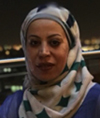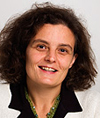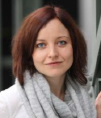(https://doi.org/10.55612/s-5002-047)

Wrya Sabir Abdullah
Graduated in Architectural Engineering and awarded (BSc., MSc. and PhD.) in Architecture Engineering in the University of Sulaimani. The focus of activity is on both Architectural Design Process and Urban Design fields. He is expert in architecture Design, Theories of Architecture, Sustainable Design and Building Technology. He is now head of Quality Assurance office in College of Engineering – University of Sulaimani. He teaches both undergraduate and postgraduate students of architecture department in both Sulaimani University and Tishk International University Sulaimani. His research interests are diverse but more related about: architecture design – design methods – urban design – architecture theories – building technology.

Nahedh Taha Al-Qemaqchi
holds a BSc (Mosul, 1985), MSc (University of Technology, Baghdad-Iraq, 1989), Ph.D. (University of Technology, Baghdad-Iraq, 2013) in Architecture. He is currently an Assistant Professor at the Department of Architecture, Cihan University -Sulaimaniya, Iraq, and an associated Professor at the Department of Architecture, Tishk International University. Before Joining the Cihan University He was an Assistant Professor of Architecture at the College of Engineering, University of Mosul, Iraq. His research interests are diverse but are closely related to the generation of concepts in Architecture, Pedagogy of Architecture, Design of the Built Environment, Curriculum Development, and Architecture Design Studio Teaching.

Alaa S.A. Alkhafaji
is a Lecturer in Human Computer Interaction in the Department of Computer Science at the University of Mustansiriyah in Baghdad/Iraq. She completed her PhD in the School of Computing/ University of Portsmouth in Jun 2018. Her research interests are in the area of smart and ubiquitous systems to be used through mobile and wearable technologies as well as human-computer interaction design to incorporate users’ experience in designing new technologies to provide adaptive and user-friendly services.

Antonio Amado Lorenzo
is an architect and professor at the Department of Architectural Graphics – University of A Coruna – Spain, where, in 1994, he presented his doctoral thesis Central-European Influences on Art Nouveau Architecture in La Coruña. Graphic Analysis. He has given PhD level courses as The Genesis of Le Corbusier´s Architecture in several countries of America and Europe. In 2011 his book Voiture Minimum. Le Corbusier and the automobile was published by The MIT Press, and, a year after, it was distinguished with an Award of Distinction by The Society of Automotive Historians. He has written several articles published in indexed university magazines. It has also been visiting professor in several European universities as Istambul, Krakow, Poznan, Varna, Riga, etc. Since 1990 he has been teaching at the School of Architecture of A Coruna. During this time, he has also worked privately as an architect and painter.

Roberto Araya
full Professor at the Institute of Education of the University of Chile. Ph.D. in Electrical Engineering from the University of California, Los Angeles (UCLA). He works in AI applications in education, topic for which he has obtained several international awards.

Eliška Bartošová
is the coordinator of the project Social Innovation in Libraries at the Department of Information Studies and Librarianship. She earned a master’s degree in environmental studies and her research deals with the topics of sustainable development in libraries and leadership in the field of social innovation.

Jirina Belehradová Svitáková
holds a PhD in development economics from Czech University of Life Sciences and an MBA from Newton College and Warsaw Management University. She is an evaluation consultant with a history of working in the areas of European social fund and Czech development cooperation and works as the senior evaluator for the project Social Innovation in llibraries at Faculty of Arts, Masaryk university.

Fandi Bi
received the Master of Science degree in mechanical engineering in 2019 and is researching towards her PhD degree since with the Institute of Automation and Information Systems at the Technical University of Munich. Her research interests focus on identifying and measuring technical debt issues in mechatronic systems. She assists Prof. Vogel-Heuser in the lectures Automation Technology and Software Engineering for Engineers.

Oscar Boude
Researcher, and Asociate Professor in the Facultad de Educación de la Universidad de La Sabana (Bogota, Colombia). He has led different projects on ICT and higher education at the national level. He has coordinated Center for the production of digital educational content and director of professors and research of the technology center for the academy (CTA). Reviewer in different journals, both education, and especially, Educational Technology. His research interests include e-learning, Mobile learning, educational video games and ubiquitous learning.

Barbora Buchtová
worked as community curator of the project Social Innovation in Libraries at Masaryk University. Her main research interest is in the area of social networks and communities in online and offline space and their application in librarianship.

Rubén Buitrago
Researcher of the TEIN Group of the ECCI University (Bogota, Colombia), Director of the GIII-ECCI research Group and associate Professor in the Direction industrial engineering at the ECCI. He has led different R&D projects on Augmented reality applications in industrial processes and in higher education, national level. Reviewer in different journals, both education, and especially, Educational Technology. His research interests include e-learning, mixed reality (virtual-augmented), flexible learning pathways, self-regulated learning, e-learning design, personal learning environments.

Aldo de Moor
has over 25 years of working experience with both the theory and practice of the fields of Information Management and Community Informatics. In these fields, researchers and practitioners examine the effective use of ICTs for supporting the development and workings of organisations and communities. In 1999, he received his Ph.D. from Tilburg University in the Netherlands on the topic of the evolution of socio-technical systems of (online) communities and networks. From 1999-2004, he was an assistant professor at the Department of Information Management at Tilburg University. From 2005-2006, he was a senior researcher at the Semantics Technologies and Applications Research Lab of the Free University Brussels. He has been working for CommunitySense since 2007.

Monica Divitini
is professor of Cooperation Technology at the Department of Information and Computer Science, NTNU, Trondheim, Norway. She holds a PhD in Computer Science from Aalborg University, Denmark. Her research interests lie primarily in the area of cooperation technology and technology enhanced learning, with focus on mobile and ubiquitous technology. She is project leader for NFR-VERDIKT FABULA and unit coordinator for the EU-FP7 MIRROR. She is coordinator of the TESEO Lab initiative (http://research.idi.ntnu.no/teseo/), focusing on issues related to cooperation, social interaction, and learning.

Veronica Farshchian
is currently studying Political Sciences at NTNU. She has previously studiedDevelopment Studies at OsloMet University, Norway, completinga field study in Tanzania. In 2020 she worked as part time junior research assistant at the Department of Computer Science, NTNU to support research on the teacher training program.

Carlo Giovannella
Graduated in Physics, he worked long time in solid state physics as an expert of complex systems. Nowadays can be considered a Designer for the experience: expert in the technology-enhanced learning, interaction design, computer-mediated communication, design and management of processes, process and product innovation, ecosystems monitoring and benchmarking. From 2015 till 2023 has been the President of ASLERD (Association for Smart Learning Ecosystems and Regional Development); at present is member of the Executive Committee of the association as Past-President. It has been the Scientific Director of the Creative Industries Area at the Consorzio Roma Ricerche from 2013 till 2016. He is member of the Dept. of History, Cultural Heritage, Education & Society of the University of Rome Tor Vergata, where he has chaired for more than 25 years the ISIM_garage (Interfaces and Multimodal Interactive Systems), a research lab devoted to design and development of TEL-environments, tools and methods for education, interaction design, and more. He is the Editor in Chief of the journal Interaction Design and Architecture (IxD&A) since 2005. It has been involved for shorter periods in the editorial board of JeLKS and IJDLDC and it is involved in the scientific board of ET&S Journal.

Nuno M. Guimarães
graduated in Electrotechnical Engineering at Instituto Superior Técnico (IST/UTL), Portugal (1983), where he completed his Msc (1987) and PhD (1992) in Electrotechnical and Computer Engineering. He is Professor at ISCTE-University Institute of Lisbon. He was also a Professor at IST/UTL (1992/1997), Faculty of Sciences of the University of Lisbon (FCUL) (1997/2012), invited Professor at the TU Berlin (IPA/Fak V), Germany (2010), visiting scholar at the Indian Institute of Technology Gandhinagar, India (2014 and 2019) and consultant/researcher at AT&T Bell Labs, Murray Hill, NJ, USA (1989-1991). He was Dean of FCUL (2003-2009), Pro- and Vice Rector of ISCTE-University Institute of Lisbon (2012-2018), founder and member of the board of three startup IT companies (1999 to 2003). He is Senior Member of ACM (Association for Computing Machinery) since 2012. His research interests include Human Computer Interaction and User Experience Design, in the broader context of Information Systems and Digital Transformation.

Mati Heidmets
is an Estonian psychologist and educational scientist. His contributions to the fields of psychology and education have been substantial and multifaceted. Throughout his career, Mati Heidmets has held various administrative roles within the academic community. Notably, from 2001 to 2006, he served as the Rector of Tallinn Pedagogical University, which later merged into Tallinn University. During this period, he played a pivotal role in shaping the institution’s educational landscape. As a scholar, Mati’s research interests span diverse areas. These include environmental psychology, where he explores the intricate relationship between individuals and their surroundings. Additionally, he delves into the dynamics of minorities in society, shedding light on their experiences and challenges. His work also extends to educational sociology, examining the social structures and processes within educational institutions. His recent endeavors include investigation of the nonverbal behavior of social robot users and its impact on creating a sense of presence in the learning environment. His findings contribute to our understanding of how technology influences human interactions and learning outcomes.

Kathrin Land
received the Master of Science degree in electrical engineering at the University of Stuttgart, Germany in 2017 and is a research associate at the Chair of Automation and Information Systems at the Technical University of Munich since 2018. Her research interests include model-based test strategies for quality assurance of automated production systems. She assists Prof. Vogel-Heuser in the overall digital lecture and examination planning, especially in the lectures Principles of Modern Information Technology and Software Engineering for Engineers.

Catarina Lelis
is an Associate Professor in Brand Design and Innovation at the University of West London, UK. She began her professional experience back in 1997 as a graphic and software interface designer. She started her teaching experience in 2007. Her research and entrepreneurial ideas were recognised and funded by FCT, the Portuguese national funding agency for science, research and technology. Catarina led OurBrand®, an entrepreneurial project which main goal was the design, development and deployment of a technological/digital solution for the creation of participatory design-led brand centres. With this project, she won a national entrepreneurship contest, which prize took her into a one-week immersion program in Silicon Valley, and her team was selected for the semi-finals of MIT-Portugal Innovation & Entrepreneurship Initiative Building Global Innovators Venture Competition. She constituted the Brand Design Research Cluster through which she led the launch of the first international Brand Design Conference, and she has been promoting the Brand New Days, webinars on the future of brands to which she invites branding practitioners and communication designers from the most well-know and successful agencies and studios in the world. Her research interests include Brand-Oriented Ecologies, Dynamic/Flexible Brands, Smartness, Creative Skills Development, Design Literacy and User Experience.

Janika Leoste
a PhD in Educational Sciences and a M.Sc. in Economics and Finance, is an Associate Professor of Educational Robotics at Tallinn University and an Assistant Professor of IT Didactics at Tallinn University of Technology. Her research focuses on educational robotics, STEAM education, educational innovation, hybrid and blended learning. She has published 60 scholarly articles, including in Frontiers or Francis & Taylor. Since 2019 she is teaching at university, including robot-integrated learning and project based learning projects. She has supervised 12 MA students and has 4 PhD students under supervision. Janika’s previous experience includes developing accounting software and web-based games, producing cartoons and teaching robotics. Janika has successfully applied for research funding from many national and international sources, including the EU’s Horizon Europe – for example, one of her projects is an ERA Talents project EdTech Talents.

Tobias Ley
is a Professor of Learning Analytics and Educational Innovation at Tallinn University where he leads the Center of Excellence in Educational Innovation. His research has won several awards including the state science award of the Estonian Academy of Sciences in 2020, and the European Research Excellence Award for Vocational Education and Training in 2018. He has published over 100 scientific articles. Tobias has acted as general chair of the European Conference on Technology-enhanced Learning (EC-TEL) and was a member of the editorial board of the IEEE Transactions on Learning Technologies. His research interests are in technology-enhanced learning and learning analytics, human computer interaction, adaptive and collaborative learning technology. Tobias holds a PhD in Psychology and Knowledge Management from the University of Graz in Austria.

Vicente López-Chao
received the BSc(Hons) Architectural Science in 2011 and the BSc (Hons) of Architecture in 2013, both from the University College Dublin. He is a lecturer at the Department of Architectural Graphics (University of A Coruna, Spain). In 2017, he presented his doctoral thesis The impact of space design and other socio-physical variables in the teaching-learning process. He has focused his training and research on issues related to architecture and education. In parallel, he has delved into research methods in architectural graphics in the MEng in representation and design in engineering and architecture in 2019 from the University of Almeria, which he is currently developing in a doctoral thesis. He performed a pre-doctoral stay at Oxford University, and he was a lecturer at the University of Santiago de Compostela, at the University of Almeria and at the University of La Laguna. He is author of several indexed papers, international proceedings and chapter of books.

Eva Mårell-Olsson
has many years of experience of conducting projects about the use of digital technologies in the education sector (i.e., K-12). Her research interests concern gamification as a teaching design with the use of contemporary digital technologies and the innovative use of Augmented Reality (AR), Virtual Reality (VR) and Artificial intelligence (AI) in teaching and learning and how these technologies can enhance teaching and learning in various fields and disciplines. She has also been conducting the project “The World’s Smartest Dental Clinic - Digital Transformation of Dental Healthcare”, that included, for example, a project on how to use an AI (e.g., SIA) as a receptionist where patients could ask questions and get answers and communicate with the staff at the clinic.

Stavros A. Nikou
is Lecturer in Digital Education at the School of Education, University of Strathclyde, UK. He is the Course Leader of the Postgraduate Certificate in Technology Enhanced Teaching and Learning (Digital Education) at the School of Education. He holds a Ph.D. in Information Systems, University of Macedonia - Greece, a M.Sc. in Computer Science, University of Houston (CL) and a B.Sc. in Physics, Aristotle University of Thessaloniki. His research interests include technology-enhanced teaching and learning, instructional design, technology acceptance, online learning, mobile learning and assessment, AR/VR/MR. He is Senior Fellow of the Higher Education Academy (SFHEA) and Senior member of IEEE (SMIEEE).

Roman Novotný
is a design theorist, researcher and doctoral student in creative industries at Faculty of Arts, Masaryk university. His research deals with the areas of human-centered design, critical and speculative design, and transition design. He is the co-author of the Libdesign methodology and the book about design thinking methodologies for libraries “Librarians as designers” (Masaryk University Press).

Marcello Passarelli
is a PhD in Psychology, Anthropology, and Cognitive Sciences working in ITD-CNR as a research fellow since 2017. His research interests include implicit measures, statistical modeling, and social cognition, with a strong quantitative focus. During his stay in ITD-CNR, he worked on the H2020 Gaming Horizons project, focusing on the social impact of video games and gamification, on the Erasmus+ CODUR project for quality assurance of e-learning institutions, and on the Erasmus+ ENhANCE project, which designed a European curriculum for family and community nurses.

Adriana Peña Pérez Negrón
received her Ph.D. in Informatics Engineering in 2009 from the Universidad Politécnica de Madrid, Spain, sobresaliente cum laude. Her main research interest is the collaborative virtual interactions. She is a research professor at the Computer Science Department at the CUCEI of the Universidad de Guadalajara, Mexico.

Majid Rouhani
is an Associate Professor at the Norwegian University of Science and Technology, Department of Computer Science. His research interest is in computing education. He has many years of teaching experiences from college and university and nineteen years of experience in software engineering from the industry.

Jesús Salinas
Head Researcher of the Educational Technology Group of the Universitat de les Illes Balears (UIB, Spain), Director of the Institute for Educational Research and Innovation (IRIE) and Full Professor in the Department of Applied Pedagogy and Educational Psychology at the UIB. He has led different R&D projects on ICT and higher education and virtual teaching-learning environments at the national, European and international level. He has coordinated projects and networks of Interuniversity Cooperation and Scientific Research with different countries. He is Director of Edutec-e. Electronic journal of educational technology. Scientific evaluator in different Spanish and Latin American agencies. Reviewer in different journals, both education, and especially, Educational Technology. His research interests include e-learning, flexible education, flexible learning pathways with concept maps, self-regulated learning, e-learning design, personal learning environments.

Petr Škyrík
is the Vice-dean for admissions and program development, Faculty of Arts and the Department head at the Department of Information and Library Studies. He holds a Ph.D. in Economics and Management from University of Tomáš BaÅ¥a, Zlín. His main research interes is leadership in the information profession.

Tomáš Štefek
leads the Municipal library in Bratislava, Slovakia. He also worked a social innovation designer at Masaryk University, being responsible for design thinking education and activities and an incubating process for libraries interested in social innovations and community services. He holds a master’s degree from the Department of Information Studies and Librarianship, Masaryk University. He is a librarian and service designer, who has worked in public libraries in various functions for 15 years.

Jelena Stepanova
is a Teacher of Computer Sciences, ICT Manager at Valga Basic School, MA.

Emanuel Trunzer
received the B.Sc. and M.Sc. degrees in chemical engineering and the Dr.-Ing. degree in mechanical engineering from the Technical University of Munich, Germany, in 2013, 2016, and 2020, respectively. His research interests include model-driven system architectures for data collection in Industrie 4.0 scenarios and data analytics for Cyber Physical Production System and the industrial Internet of Things. During the COVID-19 digital transition, he coordinated the chair’s general digitalization concept.

Eva Víchová
works as an analyst at the Institute of Computer Science. She earned a master’s degree in information science at Masaryk University. She worked in the Partner network of information professionals, in the Centre for Non-profit Sector Research and as a librarian in the public and academic library. She was an editor of the book Communities, Network and Cooperation (Masaryk University Press).

Birgit Vogel-Heuser
is a full Professor and Director of the Institute of Automation and Information Systems at the Technical University of Munich, Germany, since 2009. Her main research interests are systems and software engineering, and modeling of distributed and reliable embedded systems. She was a coordinator of the Collaborative Research Centre SFB 768: Managing cycles in innovation processes – integrated development of product-service systems based on technical products, member of acatech, and chair of VDI/VDE working group on industrial agents and vice chair of IFAC TC 3.1 computers in control.

Ladislava Zbiejczuk Suchá
is an assistant professor at the Department of Information Studies and Librarianship, Masaryk University. She holds a PhD in library and information science from the Comenius University, Slovakia. Her research addresses topics as innovations and service design in libraries, design research methods, and user research. She is a co-creator of the design thinking methodology for libraries, Libdesign. Her research has been published in journals including Learned Publishing, she has presented at conferences in Europe and has published a book on design process for libraries “Librarians as designers” (Masaryk University Press).
